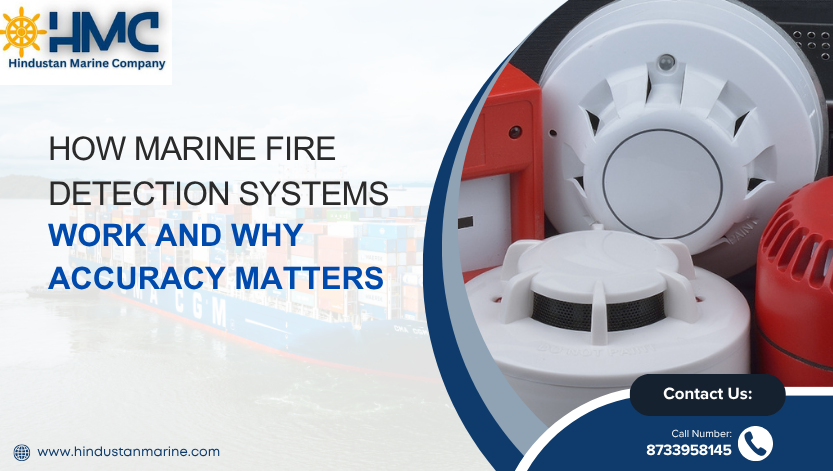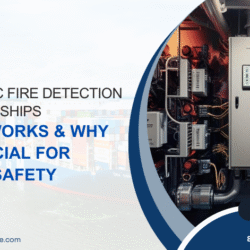
How Marine Fire Detection Systems Work and Why Accuracy Matters
Fire safety on land is a serious business, but when it comes to sea, it is absolutely critical. In the middle of an ocean or docked at a busy port, a fire on board a ship can turn into a devastating, life-threatening emergency. This is why it is very important that there is proper marine fire detection systems activated which will ensure the safety of passengers, crew, cargo and the vessel in itself. Let’s explore in this blog how these systems work and why accuracy is very important feature of all.
What are marine fire detection systems?
Marine fire detection systems are specially designed technologies which can help to detect the various fire hazards aboard ships, offshore platform or on any other marine vessels. The systems are engineered with state-of-the-art technology so that they can function reliably in extreme environments which could be constant vibration on the sea, high humidity, salt water exposure and even in the enclosed nature of ship interiors which might pose unique challenges in itself. Unlike the standard fire alarms, which are used in buildings or that you see on land, marine systems follow International Maritime safety standards. They need to be approved by regulatory authorities like International Maritime Organization (IMO) and other classification societies.
How do the systems work?
The core purpose of a fire detection system, as the term suggests, is to identify the earliest signs of any form of fire, whether it is smoke, heat or flame. The crew must be immediately alerted.
- Sensors
A typical marine fire detection system will include sensors or detectors. They are placed in key locations throughout the ship, which could be the cargoes, in kitchen cabins and control rooms. There are different types of sensors, such as smoke detectors, heat detectors, and flame detectors. The smoke detectors can be optical or ionization-based. The heat detectors are such designed so that they can respond to a sudden increase in temperature, and the flame detectors help to identify the infrared or ultraviolet light emitted by the flames.
- Control panel
This is the brain of the system. Once a detector senses fire or smoke, it sends a signal to the control panel immediately. It is then the panel that processes the information and decides how to trigger the alert.
- Alarm and notification system
If a fire is confirmed, alarms which are both visual and audible are activated all across the ship. There is an advanced system which can also alert fire suppression mechanisms automatically.
- For monitoring
Monitoring and recording most marine fire systems log data is vital so that there can be a proper study of the fire event; they can be reviewed later for investigation and be improved to avoid any other such mishaps.
Why does accuracy matter so much?
When you are out at the sea, every second is important. A delay or false alarm can cause huge panic and disrupt operation and even lead to a more greater damage. That is why accuracy is at the heart of any effective fire detection system in the marine.
False positives waste resources
Imagine a crew responding to a fire alert only to find out that it was triggered by some steam from a galley or probably engine heat. There might be unnecessary evacuations and shutdowns, which can cause financial losses and even increase the fatigue amongst the crew members and the passengers as well.
False negatives can be deadly
Even worse, if a system fails to detect an actual fire due to some poor placement or faulty sensors, or any system error, the result can be disastrous. Fire spreads rapidly in confined marine spaces, especially in the engine rooms or the storage areas, because they have the most flammable materials.
Precision helps in quick isolation
The accurate systems are very important because it help to pinpoint the exact location of the spread. It enables the crew members to isolate and extinguish the fire quickly, causing minimal damage. Some systems can even integrate with fire suppression setups, which can activate the carbon dioxide or water mist systems automatically in the targeted areas.
Regular maintenance and system upgrades
Having a system is not enough, regardless of how costly or precise it may be. There must be regular inspections and testing of marine fire detection systems to maintain their efficacy. Corrosion, dust, wear, and tear can all have some bad effects on the sensor’s sensitivity over time. You should reach out to the trained personnel to check the detectors, wiring, and control panels as part of the routine safety audits. Moreover, the technology and fire detection is constantly evolving. Upgrading to smart sensors and integrating these kinds of systems with the ship automation software is one of the most important things that should be done in today’s time. It can greatly enhance the overall safety of the crew, passengers and cargo and the vessel itself.
Fire detection is not just a regulatory requirement, but it is a commitment towards safety. It serves marine fire detection systems serve as the first line of defense against one of the most dangerous threats, which is fire. It’s important to have their accuracy, which means that you are in a controlled situation, even in a case of catastrophe. As shipping technology has evolved, investing in precise, modern and well maintained fire detection systems should be the top priority of every marine operator.



 Fast Delivery
Fast Delivery Easy Returns
Easy Returns Instant Quote
Instant Quote Product Demo
Product Demo